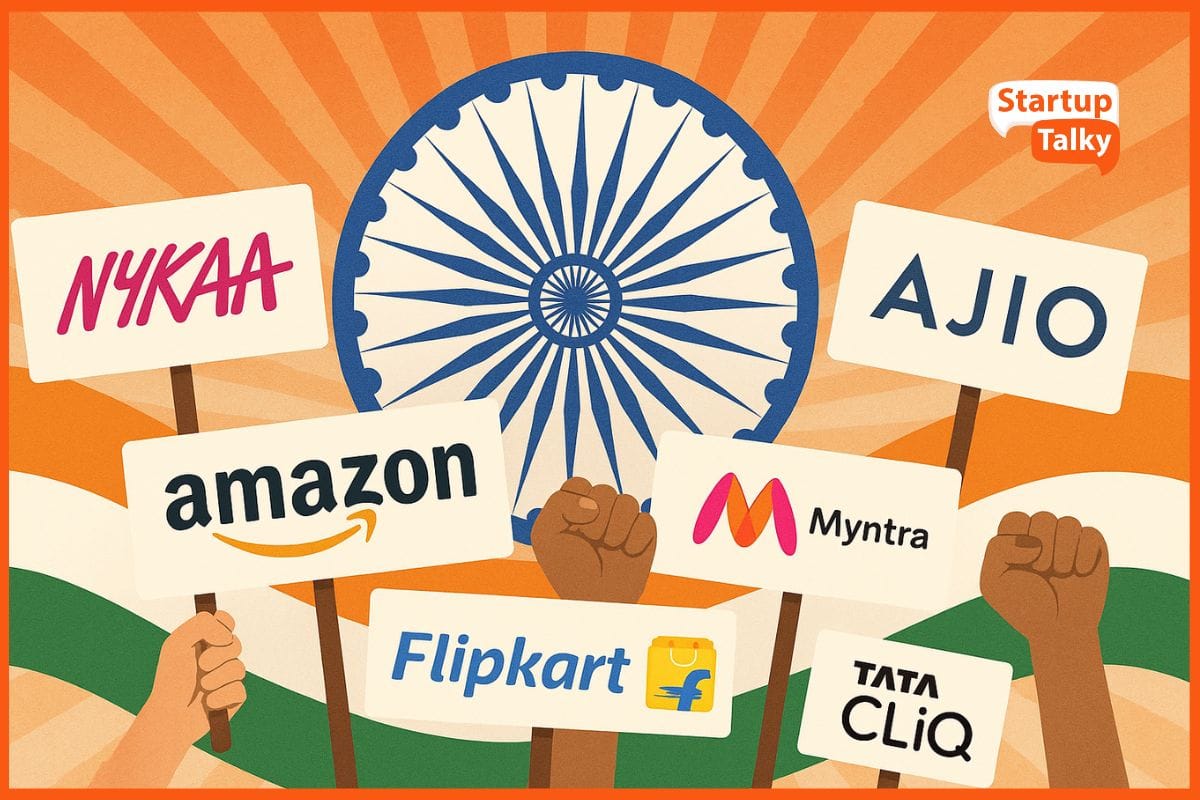As India is gearing up for its biggest festive season, two popular household names, Amazon and Flipkart, are preparing for another high-stakes sales face-off. This year, it is not about huge discounts or midnight flash sales. The backdrop is far bigger, as it is the rollout of GST 2.0, scheduled for September 22, 2025.
This means that the way they calculate value for money is set to change for millions of shoppers. For sellers, it simply means price change, compliance, and stock strategies just weeks before the sales begin.
Moreover, the intersection of the Amazon vs Flipkart rivalry and GST reforms will showcase how Indians spend, save, and celebrate in 2025. This blog discusses these shifts and how the new tax rules could shape not only your festive cart but also the broader e-commerce landscape.
Why GST 2.0 Can Turn 2025 Into the Biggest Festive Sale?
Flipkart Calls It a “Landmark” Move
Amazon Praises Simplified Two-rate Structure
What Makes the GST Rollout a Game-Changer for Online Shopping?
What Do Experts Predict for Amazon and Flipkart Festive Sales?
From Gadgets to Appliances: How Platforms Compete for Attention?
The GST Cut Advantage
Bank Tie-Ups and Payment Offers
The Bigger Picture: Festive Shopping Outlook 2025
Why GST 2.0 Can Turn 2025 Into the Biggest Festive Sale?
The GST Council has rolled out a simplified two-slab structure of 5% and 18%, pulling several items down from the higher 28% bracket. Big-ticket appliances like TVs and air-conditioners are among the biggest beneficiaries, now taxed at 18%. For consumers, it means better affordability; for marketplaces, it brings pricing clarity just in time for the sales.
Analysts expect this move to unlock delayed demand, with festive e-commerce sales projected to surge 27% year-on-year to nearly INR 1.2 lakh crore in 2025. To maximize the momentum, Amazon and Flipkart are going beyond discounts, using membership perks like Amazon Prime and Flipkart Plus/Black to drive loyalty and early access sales.
Flipkart Calls It a “Landmark” Move

Flipkart has been quick to welcome the new GST reform, calling it a game-changer for businesses and consumers alike.
“Timely implementation of these reforms ahead of the festival season will surely give a huge boost to consumption across categories, widen market access, and accelerate our collective journey towards a Viksit Bharat,” said Rajneesh Kumar, Chief Corporate Affairs Officer at Flipkart Group.
By easing compliance for small businesses, Flipkart expects a surge in seller participation and higher demand during the high-spending festive quarter.
Amazon Praises Simplified Two-rate Structure

Amazon sees the reform as a catalyst that will simplify operations and empower sellers at scale. A spokesperson emphasized how a streamlined two-rate GST structure will reduce compliance complexity and bring much-needed stability.
“This reform empowers thousands of small sellers, especially those from tier-2 and tier-3 cities, to effortlessly reach customers nationwide,” the company noted. With simplified taxes, Amazon expects more predictability for businesses and smoother operations during its mega sale season.
What Makes the GST Rollout a Game-Changer for Online Shopping?
The timing of the GST changes couldn’t have been better. In August, many shoppers delayed big-ticket purchases, waiting for tax cuts to take effect. At the same time, e-commerce companies held back on logistics and marketing spends until there was clarity on tax rates.
Now, with the new rules coming into force from September 22, both Amazon and Flipkart are gearing up to unleash their flagship events; Flipkart’s Big Billion Days (starting September 23) and Amazon’s Great Indian Festival, expected to launch within hours of it.
What Do Experts Predict for Amazon and Flipkart Festive Sales?
Industry experts believe this GST reform will directly translate into higher festive spending. According to Satish Meena, founder of Datum Intelligence, “The cuts should boost festive spending, especially in categories like TVs, ACs, and large appliances.”
Datum Intelligence projects India’s online festive sales in 2025 will surge 27% YoY to INR 1.2 lakh crore, compared to nearly INR 1 lakh crore in 2024 and INR 81,000 crore in 2023. Without the GST relief, growth was expected to be just 5–7%.

From Gadgets to Appliances: How Platforms Compete for Attention?
Electronics and home appliances are set to dominate wish lists this season. From smartphones to electronics and appliances shoppers, can expect steep discounts. Amazon and Flipkart are competing fiercely to grab attention in these high-value categories.
Appliance Makers Expect a Tailwind
Consumer durable brands are equally optimistic. Kamal Nandi, Business Head & EVP at Godrej Appliances, said lower taxes on ACs, dishwashers, and other big-ticket items will help deepen market penetration.
“Given the increasingly harsh summers in India, air conditioners are no longer a luxury. The GST drop improves affordability and is expected to boost adoption over time,” he explained.
Smartphones Take Center Stage

When it comes to wish lists, smartphones are once again the headline act. Amazon is teasing up to 40% off on popular models from Apple, Samsung, iQOO, and OnePlus, while Flipkart is making noise around marquee launches like the iPhone 16, Samsung Galaxy S24, and Motorola Edge 60 Pro.
Both platforms are also placing big bets on tablets and premium upgrades, showcasing products like Samsung’s Galaxy Tab S11 series and the Galaxy S25 FE. For consumers looking to upgrade, this festive season is shaping up to be an all-out tech bonanza.
Electronics and Appliances: Heavy Discounts in Store
While smartphones are the headliners, appliances and electronics are strong supporting acts. Amazon promises up to 80% off on gadgets and accessories from HP, Sony, and boAt, and 65% off on appliances from LG, Haier, and Godrej. Flipkart’s “double discounts” campaign targets big-ticket items like washing machines, TVs, and laptops, aiming to attract both first-time buyers and loyal shoppers.
Fashion, Lifestyle, and Beauty in the Mix
Beyond gadgets, both players are gearing up for fashion and lifestyle promotions. Amazon is rolling out 50–80% discounts on apparel and grooming products from Crocs, L’Oréal, and Titan, while also spotlighting its Karigar, Saheli, and Local Shops collections.
Flipkart is countering by putting muscle behind furniture, apparel, and lifestyle categories under the Big Billion Days banner. Its focus isn’t just on urban shoppers but also on attracting first-time online buyers from smaller towns.
The GST Cut Advantage
What makes this year different is the timing. The new GST cut, effective September 22, is reshaping how platforms plan their offers. With prices already reduced across essentials, electronics, and appliances, Amazon and Flipkart have more room to sweeten their deals.
Insiders say sellers are quickly adjusting inventories and invoices to reflect the new tax rates, ensuring that by the time the festive sales open, shoppers see the benefits directly in their carts. It’s a move that could make this season one of the most value-driven in years.
Bank Tie-Ups and Payment Offers
In the battle for checkout conversions, banking tie-ups and payment flexibility are emerging as powerful hooks. Amazon is partnering with the State Bank of India for 10% instant discounts, while Flipkart is aligning with Axis Bank and ICICI Bank for similar perks.
Both are leaning heavily on EMI schemes, pay-later options, and UPI-based discounts, making big-ticket purchases, whether it’s an iPhone or a washing machine, more budget-friendly.
The Bigger Picture: Festive Shopping Outlook 2025
According to the Datum Festive Barometer, India’s online festive sales are expected to reach INR 1.2 lakh crore in 2025, reflecting strong growth compared to previous years. Smartphones and lifestyle products still account for over half of all spending, but categories like groceries, personal care, and appliances are expanding their share, making the festive basket more diverse.
One trend to watch is the rise of quick commerce; platforms like Blinkit, Zepto, and Instamart are expected to handle 12% of festive sales, up from 8% in 2024, as consumers increasingly turn to instant delivery for last-minute needs.
Conclusion
Even with new players entering the market and innovative shopping formats gaining traction, Amazon and Flipkart remain the go-to platforms for most shoppers, with more than 80% planning to make purchases on at least one of them this festive season.
What sets 2025 apart isn’t just the depth of discounts; it’s the environment in which they’re being offered. Consumer confidence is at a high, tax cuts have boosted affordability, and platforms are innovating aggressively. Put together, this festive season promises to be unlike anything we have seen in recent years, bigger, sharper, and more competitive.

FAQs
When will GST 2.0 be implemented in India?
GST 2.0 will roll out on September 22, 2025, just a day before Flipkart’s Big Billion Days and Amazon’s Great Indian Festival, making it a crucial factor for this year’s festive shopping surge.
Which categories benefit the most from GST 2.0 cuts?
Big-ticket appliances like air-conditioners, TVs, and dishwashers benefit the most, moving from the 28% tax bracket to 18%. Smartphones, tablets, and electronics also see improved affordability during festive sales.
How are Amazon and Flipkart preparing for GST 2.0 festive sales?
Both marketplaces are reworking inventories, invoices, and pricing strategies to pass on the tax cut benefits to consumers. They’re also boosting membership perks, flash deals, and banking offers to maximize conversions.
